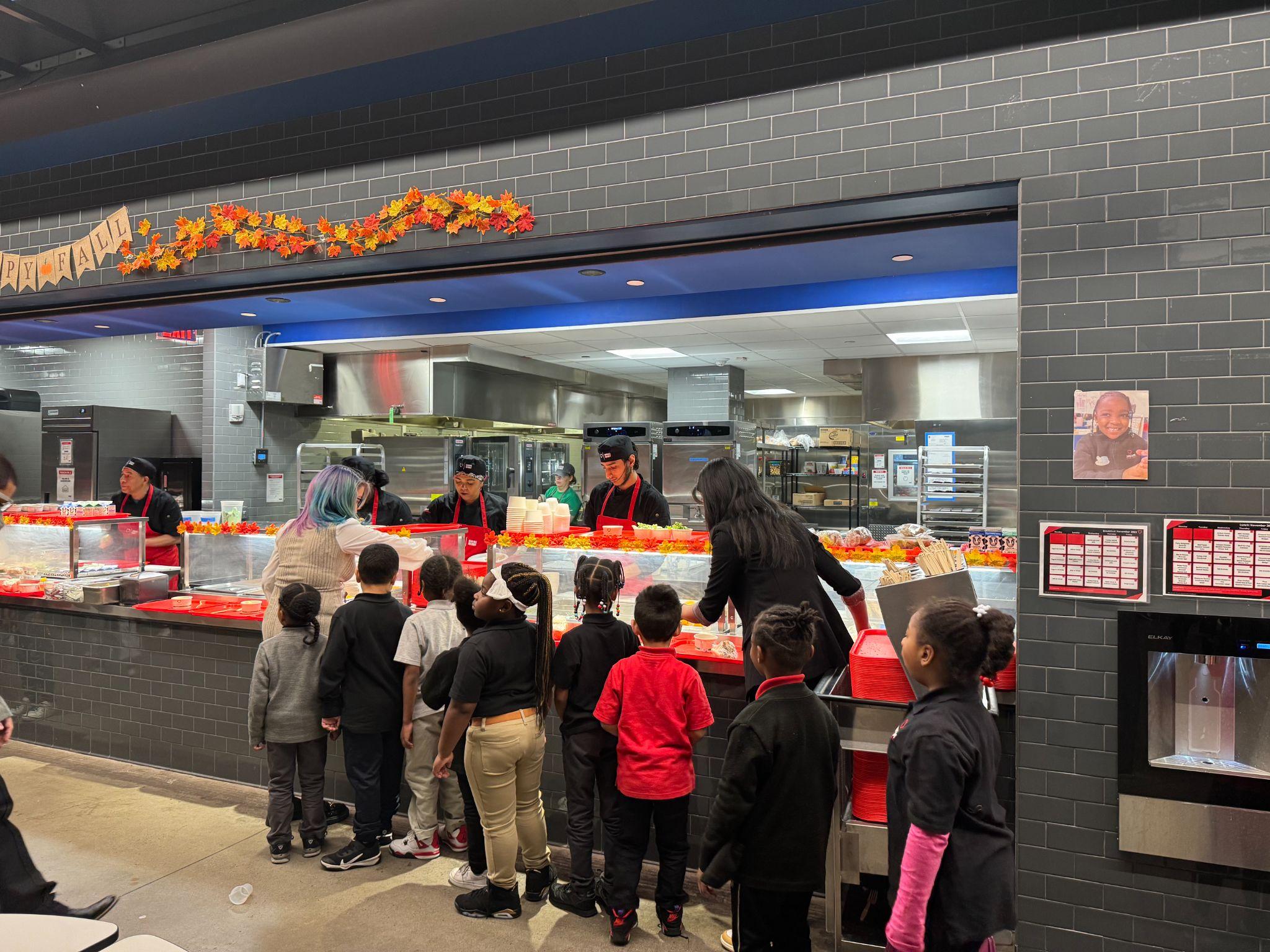(Vaya aquí para leer una version en español.)
An eager group of first graders lined up recently in the cafeteria of DREAM Charter School, a K-12 public school on Bruckner Boulevard in Mott Haven. They were awaiting a freshly made Thanksgiving-themed lunch of turkey, sweet potatoes, stuffing, and baked apples.
The lunch was made possible by the new from-scratch food program DREAM launched this fall in partnership with food service consulting company Brigaid, founded by Dan Giusti, former head chef of the Michelin-starred restaurant Noma.
The program will provide over 1,000 students with a free lunch, made from scratch, every day.
“We are proud to partner with Brigaid in their effort to make school meals that are high quality, healthy, and accessible to all children,” said Richard Berlin, co-chief executive officer at DREAM. “Food has a crucial impact on every part of a child’s life, including mental and physical well-being, social-emotional growth, and performance in the classroom.”
DREAM reports that 89% of their students qualify for free or reduced lunch. A recent DREAM press release said that the East Harlem and South Bronx communities it serves have historically been among the most likely in New York City to face food insecurity. In the Mott Haven and Melrose neighborhoods, over 54% of residents currently receive SNAP (Supplemental Nutrition Assistance Program).
Brigaid provides hands-on staff training and full-time chef placements to its partners. DREAM’s in-house culinary team is led by Brigaid Chef Persefoni Vordakas. Vordakas relocated to New York in July by way of Telluride, Colorado. There, she worked as an executive chef at one of the town’s many hotel resorts.
Vordakas, who goes by “Persey,” took a few minutes during the Thanksgiving lunch, in between high-fiving the hundreds of students anxious to greet her, to speak with the Herald about her experience.
“Working in a restaurant is very long hours, and it is very taxing; I figured if I were going to do the same thing, I’d want to do it for something that was a do-good,” she said. “It just seemed natural to give kids an opportunity to know what good food is and that it can be done at any level.”
A spokesperson for DREAM said their goal is to have 100% of students eating school food, making the program efficient enough for full reimbursement, which will not require philanthropic support. The majority of NYC public schools qualify for food funding from the Department of Education.
“So many kids came to me and said this was so good and their favorite meal so far,” said Vordakas.
Shane Samuels and Monica Gilchrist, two DREAM parents, attended the lunch to see what the new food program was about.
“It’s amazing that not only is the food good, it’s also nutritious. I love that the school is always trying to figure out how to do better,” said Samuels, who has a fourth grader attending the school.
DREAM’s partnership with Brigaid is one of the many ways the school seeks to reinforce its commitment to its Grow the Whole Child education model, said a spokesperson for dream. That model focuses on four critical elements to set students up for success: health and wellness, academics, family life, and social-emotional learning.
A 2018 study at the University of Virginia’s School of Education found that having reliable access to a sufficient amount of food could affect learning as early as kindergarten. The results showed that children experiencing food insecurity in early childhood were more likely to start kindergarten less ready than children from homes that were food-secure.
“Each day, our students have an option of fruit, vegetable, protein, and grain,” said Raymie Fernandez, chief operating officer of DREAM, while walking the Herald around one of the school’s four kitchens. “When students take meals, we want to encourage them to take the entire meal.
Bringing healthy meals and food education into the schools has been a priority for the administration of Mayor Eric Adams this year. In June, Adams’ office released “Prioritizing Food Education in Our Public Schools: A Path to Developing a Healthy Next Generation.”.
In his budget for fiscal year 2024, Adams proposed $50 million to expand the Cafeteria Enhancement Experience, which would work with more than 80 school cafeterias to create a more welcoming environment and provide students with more nutritious meals.

